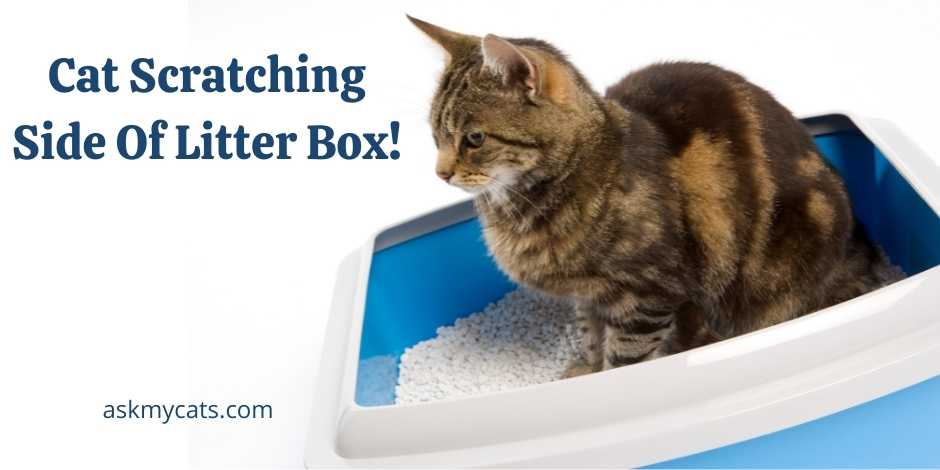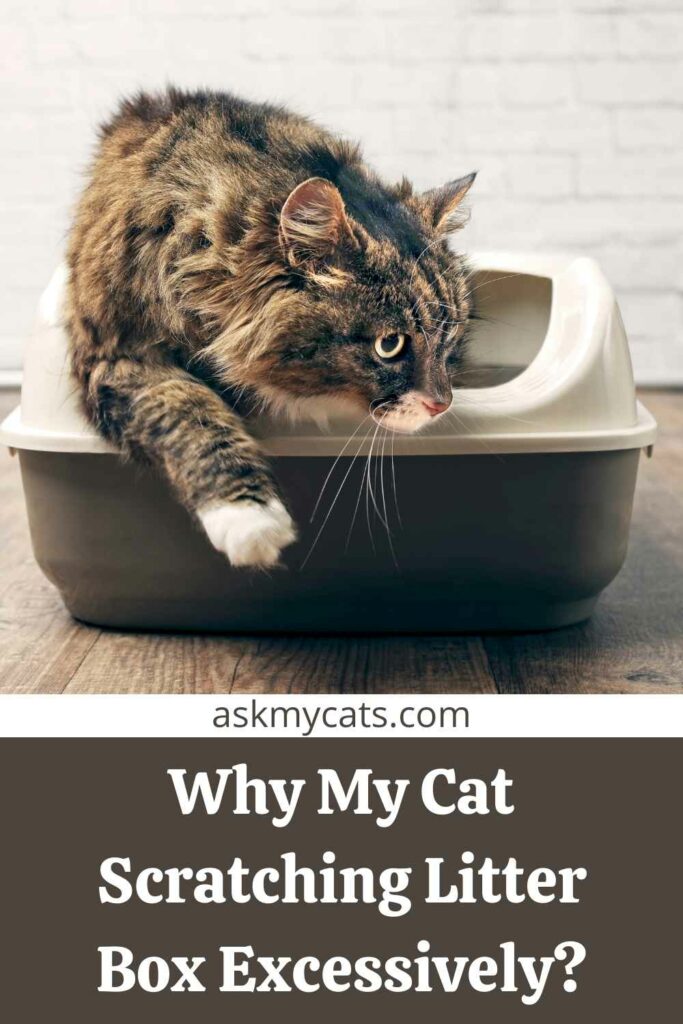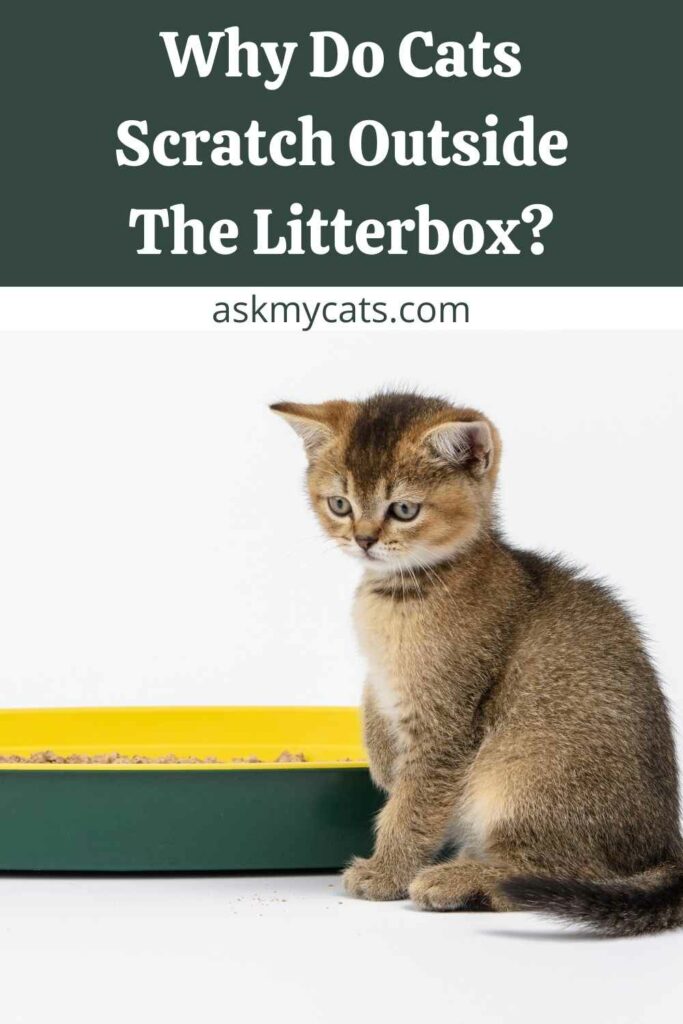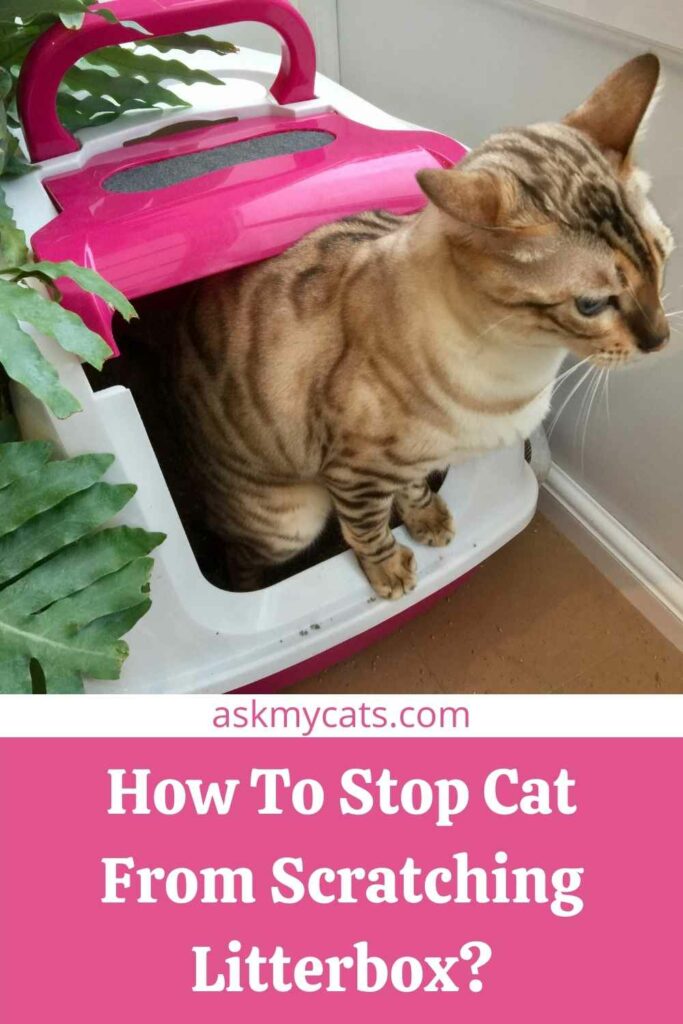Cats, for example, have their own peculiarities. Cats scratching the edges of their litter boxes is as frequent as scratching any other part of the house, which may seem strange.
Cat scratches the side of the litter box because either the box is too small, or you haven’t cleaned it in a long time, or another cat is using it.
Only if the scratching becomes excessive should you investigate what is troubling the young cat. Cat owners must figure out what is causing this shift in behavior and treat it as soon as feasible.
We’ll explain why your cat could scratch like this and provide some suggestions for reducing scratching.


Give Your Cat the Perfect Day
Get the Free Ebook!
Why My Cat Scratching Litter Box Excessively?
Your cat may be marking their territory as part of their natural instincts by scratching the litterbox excessively. It might be an indication of stress or a gastrointestinal problem. It’s possible that your cat’s litter box is too tiny for him, or that the litter needs to be changed.
While it’s natural for cats to hide their waste, discovering your cat scratching the litter box excessively might be concerning. This behavior can be triggered by a variety of factors; for some, it’s a harmless habit; for others, it could be the first indicator of an underlying physical or mental condition.
Whatever the cause, it’s critical to figure out what’s driving the obsessive behavior and then seek solutions.

1. Playtime
After you’ve cleaned the litter box, you could hear a weird sound emanating from it and discover it’s your cat rolling about in it like mad. It may have happened when they were only a small furballs, or it could have happened when they were an adult.
The reason may appear to be straightforward. This might simply be a kitten activity, or it could signal that your cat likes digging.
It may also serve as a reminder of the outside world or a way to tap into their natural impulses as they play and bounce around in it. Kittens, for example, may still be at the stage where they can play with just about anything.
A kitten will normally outgrow this tendency, which you may assist by diverting your kitty’s interest away from the litter box with a play session and redirecting them to a more suitable pastime.
In the event of an adult cat, a veterinary consultation may be the best option, and if in doubt, it’s always advisable to see your veterinarian.
Also, find out why my cat play in the litter box
2. Communication Skills
Having many cats may lead you to believe that there is a lot of scratching going on. If you believe that only one feline is generating the noise, the first step is to locate the culprit.
It’s possible that one or both of your feline companions scratch the litterbox to let the other cat know that they’ve used it or are using it now.
Furthermore, while scratching the litter box, cats also leave their fragrance on the litter box thanks to the scent glands in their paws. They inform the other cat of their presence in this manner.
It might also indicate that one cat is claiming the litter box as their territory, at least until the other cat comes along and does the same. Adding a second litter box might help to alleviate the competition.
Make sure neither of your cats is showing any other indications of illness. You’ll need to figure out which one is creating this noise and whether your cat’s scratching excessively in the litter box is caused by a physical or mental condition.
You might also like to know the reasons for cat digging in litter box
3. Too Much Pressure
Another reason your cat may scratch the litter box frequently is stress, and it’s crucial to figure out what’s causing it. Because cats are creatures of habit, any change in their surroundings can cause anxiety and even despair.
Cats are complicated creatures, and a number of little changes might be contributing to sadness or litter box fear.
Changing their litter box or litter might also cause them to react in the same way. Perhaps your playing schedule has changed, and your kitty partner isn’t getting enough attention.
These are little changes that you can readily detect and control, but they might be provoked by something more significant.
If you’ve just relocated, your cat may scratch the litter box excessively as a show of unhappiness, or even hide within it. Other indicators might include yowling in another room, especially late at night, or avoiding and hiding from you.
According to several research, even healthy cats can become ill when their environment changes.
Bringing a new pet home may trigger this behavior, not just because they are anxious, but also because they are attempting to claim the litter box as their own.
Purchase a second litter box so your cat does not feel compelled to battle over this area. If you’ve recently welcomed a new family member or a new lover into your life, you could have the same reaction.
Scratching the litter box excessively can be one of the numerous signs, so keep an eye out for other signs as well. Additional symptoms include lack of appetite, vomiting, diarrhea, hair loss, and weight loss or increase.
A trip to the veterinarian is required to ensure that your cat is free of illness.
If your cat is in good health, your vet may prescribe an animal behaviorist instead. This phase may assist you in determining what is causing your cat’s stress and the necessary actions to alleviate it.
It’s vital to remember that as cat parents; we should strive to offer a joyful environment for our kittens. Proper nutrition, plenty of water, scratching posts, games, and hugs are all necessary for their well-being.
Alos, check out why does my cat scratch the floor after using the litter box
Why Do Cats Scratch Outside The Litterbox?
When there isn’t enough litter, some cats may scratch the edges outside of their litter box, attempting to cover up their excrement. To eliminate any dirt adhered to their paws, your cat may scratch the edges of the litter box.

Because litter boxes aren’t endless, most cats are compelled to make noise and will accidentally scratch the sides.
If you’re a rookie cat parent, it may sound unusual, but hearing your cat excavate their litter before and after they’ve used it is healthy and a representation of their natural impulses. It’s a deeply entrenched survival technique they’ve created to keep predators at bay.
In the wild, cats would cover their waste in a similar manner, and if your cat used your yard as a litterbox, they would not be limited by the sides of the litterbox; instead, your feline buddy would be allowed to dig as deep as they wanted.
The sound of an indoor cat’s claws scraping the plastic litter box, whether on the sides or the bottom, is unavoidable. Larger quantities of litter may deter your cat from digging in the box itself, but that depends on how thorough they are diggers.
While some cats scratch the edges of the litterbox at random, others employ this smart technique to wipe their paws from the clumps of litter that get lodged between their toes.
Some cats scratch the sides on a daily basis, while others do so only after they’ve walked in their own waste or are suffering from diarrhea.
After all, the litter box is a safe haven for kittens, as well as a location where their fragrance is greatly concentrated. If they’re in a particularly playful mood, some adult cats may scratch the whole litter box, including the sides. Although it isn’t the most elegant habit, some cats are born diggers!
You might be wondering how scratching would help them claim their own toilet, yet cats constantly use their paws. Your kitten is releasing its aroma through the scent glands on its paw pads by kneading you, clawing the sofa, and scratching the edges of the litter box.
Scent-marking is a technique for cats to claim their territory, an object, or even you, their human!
If you forget to clean your cat’s litterbox, or if they don’t like the state of it because they have high standards, they will try to avoid the unclean litter and scratch the litterbox’s sides instead.
Why Does My Cat Scratch The Litterbox After Using It?
If your cat is scratching the litterbox after using it, then he is suffering from some health issues.
While constant scratching in the litter box might be harmless behavior, it can also be an indication of something more severe. That’s why it’s crucial to keep a close check on your cat’s bathroom habits.
When cleaning their litter box, regularity, as well as how much and how often, should be on our minds in order to spot any health issues or conditions early on.
Simply put, your cat’s excrement might be causing the frequent scratching. The frequency of a cat’s second meal varies from one cat to the next, although once or twice a day is a normal rule.
If your cat is pooping more frequently or less frequently than that, you should see your veterinarian and have a few tests performed to determine the source of the problem.
The quality of your cat’s excrement is also crucial, so keep your eyes open next time you scoop and check them thoroughly. The feces of a healthy person should be dark brown in color and not too mushy or firm.
It might also be a symptom of an underlying issue if they’re firm as a rock or runny, or if there’s blood in them.
Why Does My Cat Scratch The Litterbox Instead Of Litter?
If your cat is scratching the litterbox instead of litter then it means the litter is dirty or scented.
While perfumed litter might keep your cat’s toilet fresh smelling, it’s possible that your cat will dislike it. It’s possible that your cat scratching the litter box excessively is a sign that they don’t like the quality or aroma of the litter.
Some cats may even quit using it and begin defecating in other locations in the home.
While covered litter boxes provide greater privacy, they may appear to your cat to be smellier. After all, it’s a contained environment, but the quality of the plastic and how often you clean the litter box as a whole have a role.
Some cat parents like to feed their cats food that masks the odor of their excrement, but before making the switch, be sure there are no health concerns.
Why Does My Cat Scratch The Edge Of Her Litterbox?
Your cat may have some litter particles attached to its paws and is scratching the edges of her litterbox to get rid of them.
This can happen if the litter box hasn’t been cleaned in a timely manner or if they have diarrhea.
In that scenario, pay attention to your cat’s health and determine whether or not they require medical treatment. You might also give them a bath or some cat-friendly wipes to help them clean up.
Scratching is a natural, instinctual action that you don’t want to fully prevent. Getting your cat to scratch approved items, such as a scratching post, should be your focus instead.
How To Stop Cat From Scratching Litterbox?
If your cat is scratching the edges or the floor surrounding the litter box excessively, there is just not enough area for them. You must make room in the litterbox for your cat.

The amount of litter required in a litter box is determined by the brand’s recommendations, the type of litter used, such as clay, crystal, or wood pellet litter, and the litter box’s size.
The less litter you use, the louder the scratching sound and the more accessible the sides of a litter box are. On the other hand, too much trash may lessen noise, but it may end up spreading outside.
It’s also crucial to take your cat’s preferences into account. Scented litter may appeal to you, but it is not suitable for your cat.
So, if your clever kitten is clawing the edges of the litter box excessively, it might be a sign that the lavender or summer breeze aroma isn’t working for them!
Litter should also be cleaned carefully and changed on a regular basis. The persistent odor of old or soiled litter, especially if you have more than one cat, may cause a strike, during which some cats stop using it and begin urinating in inappropriate places.
When it comes to trash, there are numerous alternative and environmentally friendly solutions available, and you can even pick how thick or small the grains should be.
Most companies provide a variety of litters to meet your cat’s diverse demands; some are ideal for multi-cat households or long-haired breeds, and in some circumstances, you can even combine various cat litters if they’re compatible and your cat is content with the result!
Frequently Asked Questions
Why does my cat randomly scratch the floor?
Cats scratch items in their environment for a variety of reasons: To get rid of their claws’ dead outer layer. They use smell glands on their paws to mark their territory by leaving both a visible and a scent imprint. They need to extend their body and bend their claws and feet.
Why do cats scratch the floor after pooping?
Cats sometimes exhibit strange mannerisms, such as clawing the floor after urinating. When a litter box fails to disguise the odor of its feces, this behavior develops. If this is the case, cleaning out the litter box will eliminate the odor of your cat’s excrement.
Why does my cat keep playing in the litter box?
Some cats simply like digging in their litter boxes and playing with them. This is common in most cases. However, scratching in the litter box might get excessive at times. Consider that anything could be bothering her before you put in the earplugs.
Final Words
Although the sound of your cat clawing the edge of her litter box may frustrate you, there is typically no need to be concerned. It’s possible that your cat is doing it to establish her territory, leave her smell, or maintain the condition of her claws.
Scratching, on the other hand, might be a sign of stress or worry; if it’s accompanied by symptoms like weakness or frequent urination, take your cat to the vet for a full examination.
Leave your questions in the comments section below.
Also, check out why does my cat scratch the wall
